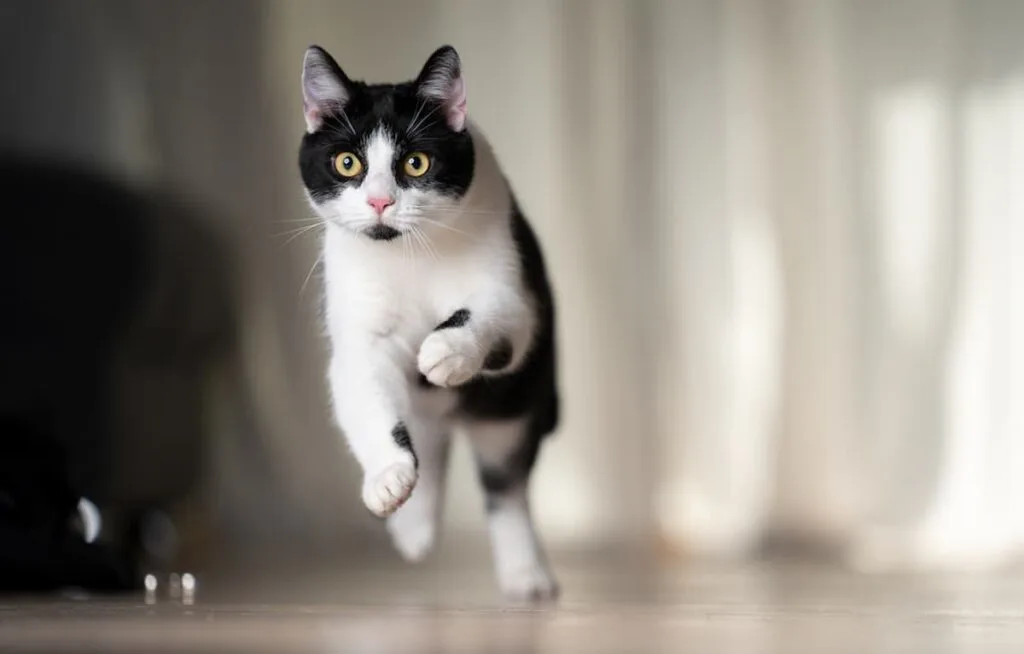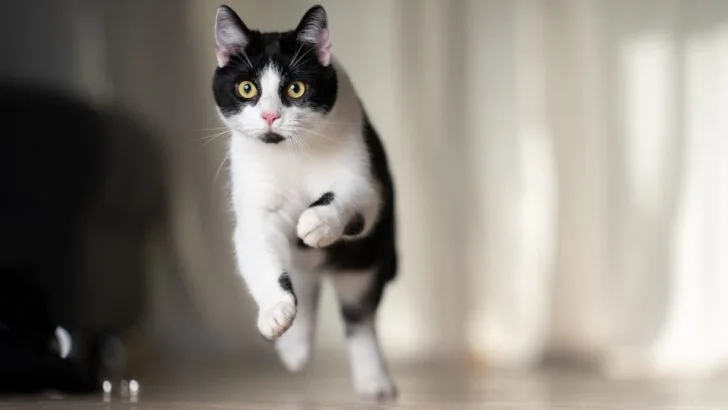If you’re a cat owner, you’ve probably experienced the phenomenon of your furry friend suddenly darting after you for seemingly no reason. While it may seem odd or comical, this behavior is common among cats. But why do cats do this?
Cats run after you for a few reasons, including being playful or intrigued and seeking your attention. Sometimes their hunting instinct is a factor, but rarely is a cat chasing you due to aggression.
Whatever the reason may be, this behavior is certainly entertaining to watch. But cat owners need to understand why their pets are doing it, so they can respond appropriately and ensure their cats are happy and healthy.
Let’s explore why cats run after their owners and what you can do to encourage or discourage this behavior.

Instinctual Behavior Can Cause Cats to Chase You
Have you ever wondered why your cat suddenly runs after you, seemingly out of nowhere? This behavior can be quite perplexing, but it has much to do with your cat’s instinctual behavior. Let’s take a closer look at some of the reasons why cats run after their owners.
Hunting Instinct
Cats are natural hunters; their instincts drive them to chase and pounce on prey. Even though your cat may be well-fed and have no need to hunt for food, the desire to stalk and capture prey is still deeply ingrained in their DNA. When your cat runs after you, it may exhibit this hunting behavior as you move quickly and unpredictably like prey.
Additionally, cats have excellent vision and can see movement exceptionally well. This means that even small movements, like the twitch of a toe or the flick of a hand, can trigger your cat’s hunting instincts and cause them to give chase.
Play Instinct
Cats are also known for their playful nature, and running after their owners can be a way for them to engage in play. Just like human children, cats need to play to stay physically and mentally healthy. Running after you can be a form of play for your cat, and they may enjoy the thrill of the chase and the physical activity it provides.
It’s important to note that play behavior in cats can sometimes be mistaken for aggression. If your cat is running after you and biting or scratching, it’s important to redirect their behavior to an appropriate toy or object. This will help them safely satisfy their play instinct for you and your cat.

Bonding and Attention-Seeking
If you’ve got a cat who’s very emotionally attached to you like ours, then you may find yourself getting chased due to them wanting more of your attention. For them, the chase is a bonding experience, and you can even turn this into a game if you’d like.
Affection and Love
One of the reasons why cats run after their owners is because they want to show affection and love. Cats are known for being independent creatures, but they still crave attention and affection from their owners. Running after you is their way of showing that they love and care for you.
When cats run after their owners, they may also rub against their legs, purr, or meow. These are all signs of affection and love. Cats may also try to get closer to their owners by sitting on their laps or sleeping with them. These behaviors are all ways that cats show their love and affection for their owners.
Attention-Seeking
Another reason why cats run after their owners is that they are attention-seeking. Cats are intelligent creatures, and they know that running after their owners will get them attention. If a cat feels bored or lonely, it may run after its owner to get some attention and playtime.
Attention-seeking behaviors can also indicate that your cat is feeling stressed or anxious. If your cat is running after you excessively, it may be a sign that they need more attention and playtime. You must give your cat enough attention and playtime to keep them happy and healthy.
If your cat is running after you excessively, paying attention to their behavior and trying to figure out what they need is essential. Providing your cat with plenty of attention, playtime, and affection can help to reduce their attention-seeking behaviors and strengthen the bond between you and your furry friend.

Territorial Behavior
As natural hunters, cats have a strong instinct to protect their territory. They mark their territory by rubbing their scent glands on objects, scratching surfaces, and spraying urine. This behavior is especially common in unneutered male cats but can also be seen in female and neutered males.
When a cat perceives a threat to their territory, it may become aggressive and chase after the perceived intruder. This can include chasing after their owners, other pets in the household, or even wildlife outside. It’s important to remember that this behavior is not personal and is simply a cat’s way of protecting what they perceive as its own.
To prevent territorial behavior, providing your cat with plenty of space and resources is important. This includes separate feeding areas, litter boxes, and sleeping spots for each cat in a multi-cat household. Providing plenty of toys and scratching posts can also help to redirect your cat’s natural hunting instincts.
If your cat exhibits territorial behavior, it’s important to address the issue immediately. Punishing your cat for their behavior will only make the situation worse and can lead to increased aggression. Instead, try to redirect their attention with toys or treats and provide plenty of positive reinforcement when they exhibit calm behavior.
In some cases, working with a professional animal behaviorist may be necessary to address more severe cases of territorial behavior. With patience and consistency, however, most cats can learn to coexist peacefully with other pets and humans in their environment.

Medical Reasons
While most cats run after their owners for fun or attention, some medical reasons could explain this behavior. Here are a few possible medical causes:
- Hyperthyroidism: This is common in older cats where the thyroid gland produces too much thyroid hormone. Symptoms include weight loss, increased appetite, and hyperactivity.
- Anxiety: Cats can experience anxiety for various reasons, such as changes in routine, new pets, or moving to a new home. Anxiety can cause cats to act out differently, including running after their owners.
- Pain: If your cat is in pain, it may run after you to get your attention. Pain can be caused by various conditions, such as arthritis or dental problems.
If you suspect that your cat’s running behavior is due to a medical issue, it’s important to take them to the vet for a checkup. Your vet can run tests to determine if an underlying condition needs to be addressed. Medication or other treatments are sometimes necessary to manage the condition and improve your cat’s quality of life.

My name is James, and welcome to FAQCats!
Along with our team of cat owners, expert pet enthusiasts, and pet professionals, we aim to write engaging helpful, engaging content about cats. At FAQCats we strive to provide content that’s accurate and fun to read. Our team writes about everything related to cats; even the most complex of topics. Through extensive research and caring for our own fur-pals, we’re able to provide something cat owners worldwide will love. Have a look around, and leave us feedback anytime!

